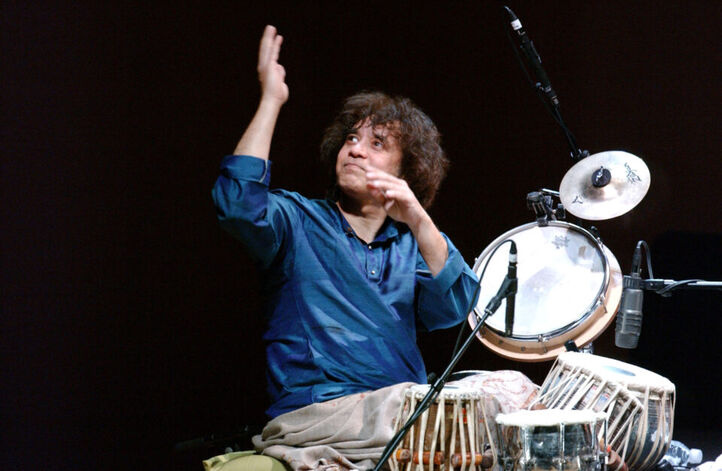The world of Indian classical music loses one of its superstars on the night of December 15, 2024. Tabla Maestro Zakir Hussain passed away at the age of 73 after being admitted to the ICU ward of San Francisco Hospital with a pulmonary disorder.
Social Media Ruckus
While reports of his severity of illness started to circulate a day before, social media was flooded with posts reacting to the tabla maestro’s death before it was confirmed. Zakir Hussain’s nephew, Ameer Aulia, swiftly denied his demise 11 hours before his death. Other members of his family were also present with him when Hussain was battling death in the hospital.
Despite the clarification, social media tributes started flooding in the early evening, on Sunday. This included posts from Union Minister Jyotiraditya Scindia, Assam CM Himanta Biswa Sarma and Congress Leader Rahul Gandhi. The ruckus does not stop here. The Ministry of Information and Broadcasting tweeted on their official socials, “The world has lost a true musical genius. Zakir Hussain’s contribution to music will forever be cherished.” this message was later deleted like other news reports that claimed his demise while he was breathing his last breath.
Hussain’s manager, Nirmala Bachani, revealed that he was dealing with blood pressure. Bachani said, “We ask for everyone’s well wishes and prayers during this challenging time.”
Hussain’s Life at a Glance
Hussain’s rhythmic journey started by reciting stutis of Ma Saraswati, verses of the Holy Quran and hymns of the Bible, as his daily ritual. The artist had a knack for creating a story out of percussion sounds using his unconventional spontaneity and skills. The Padma Vibhushan awardee would charm art experts, fusion seekers, and Bollywood fans alike. Because of this large appeal for Zakir Hussain’s percussion sounds, he won three Grammys in one night, in February this year.
Born to Ustad Alla Rakha, who accompanied Pandit Ravi Shankar, Hussain grew up in Mumbai in an environment of believing that every instrument has a spirit. It did not take time and Tabla chose Hussain. He started to play the instrument at the age of three and by the time he reached his teenage, the instrument had become almost inseparable from him.
During his career, the versatile Tabla artist mixed complex rhythms, intricate patterns, and nuances dynamics that converted the sound of Tabla into a melody. Hussain played alongside Tabla artists like Anindo Chatterjee, Shafaat Ahmed Khan, Kumar Bose and Swapan Chaudhary. Slowly, Zakir Hussain became the face of the instrument ‘Tabla’ for the entire world.
His other brothers, Taufiq and Fazal, are noticeable percussionists, but it is Hussain who took his father‘s legacy to the next level. Trained in Punjab Gharana, the child prodigy first performed professionally at the age of 12 under his teacher-father. By 19, Hussain started teaching at University of Washington before joining Ustad Ali Akbar Khan‘s music college in San Francisco. There he meets his life partner, Antonia Minnecola.
The Shakti Band Fusion
Zakir Hussain’s meeting with the iconic English guitarist, John McLaughlin, turned into a lifelong bond and the formation of a groundbreaking band called Shakti in 1973. The band included L Shankar and percussionist TH Vinayakram. Shakti band had the potential of blending Hindustani and Carnatic classical music with Western jazz to create a fusion version.
Fusion was never a novelty for Zakir Hussain, who had grown up listening to stories of how Aamir Khusrow blended the Indian tradition of Dhrupad and Haveli Sangeet with Sufi Qual to create Khayal. This understanding expanded as Zakir Hussain started contributing music in various films like Francis Ford Coppola’s Apocalypse Now, Mr and Mrs Iyer to Dev Patel‘s Monkey Man, recently.
Zakir Hussain became a spark with his ‘Wah Taj!’ commercial. But this fame did not diminish his humility while age did not weaken his curiosity. Every time his fans would serve him with words like perfection and mastery, he would take a breath and respond, “I haven’t played good enough to quit.”


